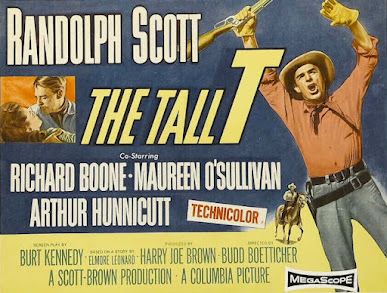The return to the way station is an early example of the film’s provocative cruelty. Though Brennan’s vow to bring the manager’s kid candy certainly comes on like the planting of a narrative seed, it dies out right quick when he learn the kid and his father have both been killed and thrown down a well by the would-be robbers Frank (Richard Boone), Chink (Henry Silva), and Billy Jack (Skip Homeier). Willard’s tucking tail into cowardice, on other hand, feels more inevitable, the self-regarding irritability with which Hubbard plays his introductory scenes giving no allusions that he’s anything else. Even so, the swiftness with which he flips, insisting to Frank that he can cut them a better deal than sticking up an approaching stagecoach by getting his wife’s wealthy husband to cough up a massive ransom for his daughter’s safe turn, is revealingly spineless. And his end, riding ahead and away from his wife without so much as a goodbye, gunned down by Chink at Frank’s order in cold blood, feels like Boetticher daring you to cheer at this lily-liver’s comeuppance.
For a good chunk of “The Tall T,”, in fact, Doretta hardly says a word, as much a passenger in her own life as she is in that held-up stagecoach. Adapted from a short story by Elmore Leonard, however, “The Tall T” is not succumbing to the invisible woman archetype but exploring it. Indeed, sadistically eyeing her, Chink notes that he “knew a quiet woman once. Outside, calm as Sunday. Inside, wild as mountain scenery.” Frank and his crew force her into her expected role, cooking for them and making her coffee, though when she burns her hand on the coffeepot, you know full well it’s a role she’s not cut out to play, trapped not just here, in the middle of nowhere, but in the world itself.
Though the situation would seem to suggest Brennan as the White Hat and Frank as the Black Hat, the result is far more complicated, the two characters emerging not so much as reflections of one another as unexpected opposites. Frank is the one who dreams of buying himself a ranch and settling down, even if to do so means making a big score by illegal means, which Boetticher is refreshingly happy to let speak for itself as a condition of a murky world. And though Boone has a heinous laugh when something strikes his fancy, the character emits gentlemanly touches too, taking a meal to Doretta and leaving it for her with nary a word or motion of harassment. Brennan, on the other hand, might scheme for ways to get free, like turning Frank’s two henchmen against one another, but one involves essentially talking Billy Jack into physically assaulting Doretta, providing Brennan an opening.
He might save her but it’s a nasty inversion of the hero archetype, setting a predator loose to play hero to save his own skin. He also lets Frank go when he has a chance to shoot him down in cold blood, honoring the debt Frank insinuates is owed. And that Frank could well make a clean getaway only to turn back around and get himself shot dead feels like the conclusion of “Once Upon a Time in the West” stripped of all its operatic grandeur, laid bare as being nothing more than dumb as a skunk.





1 comment:
I like 7 Men From Now more than this one
Post a Comment